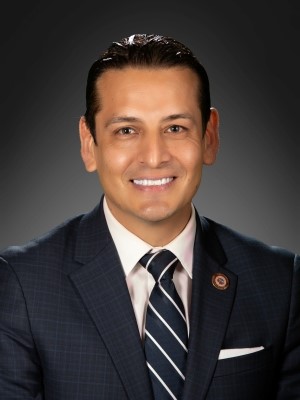2023-16
Obesity and Medicaid: Removing Barriers for Our Most Vulnerable Populations
Sponsored by Rep. Rafael Anchía (TX), Rep. Marcelino Quiñonez (AZ) and Sen. Cristina Castro (IL)
Reported to the Caucus by the NHCSL Healthcare Task Force
Rep. Alma Hernández (AZ), Chair
Unanimously ratified by the Caucus on December 2, 2023.
WHEREAS, obesity is recognized as a disease by the National Institutes of Health (NIH), [1] the American Medical Association (AMA), [2] the American Association of Clinical Endocrinologists (AACE) [3] and the Endocrine Society; [4] and,
WHEREAS, data from the Centers for Disease Control (CDC) shows that 45.6% of Hispanic adults live with obesity, and this disease has been negatively impacting Hispanic children, adults, and seniors for generations; [5] and,
WHEREAS, the National Hispanic Caucus of State Legislators (NHCSL) has repeatedly addressed obesity prevention and mitigation in previous policies, such as:
- Resolution 2013-02, Addressing the Obesity Epidemic in America,
- Resolution 2018-21, Expanding Access to Fresh Fruits and Vegetables Via Healthy Food Financing Initiatives,
- Resolution 2020-07, Reducing Obesity, the Primary Comorbidity in the Fight against COVID-19, and,
- Resolution 2022-03, Promoting Food Equity and Nutritional Security in the United States, including extending SNAP to Puerto Rico; and,
WHEREAS, a report in 2018 from the U.S. Department of Health & Human Services Office of Minority Health stated that Hispanic Americans were 20% more likely to have obesity than non-Hispanic whites; [6] and,
WHEREAS, even when the Food and Drug Administration (FDA) has approved several pharmaceuticals as safe and effective for the treatment of obesity, patients with obesity face significant social stigma, and some may even experience healthcare coverage barriers when seeking comprehensive obesity treatment, which includes obesity screening, nutritional counseling, intensive behavioral therapy, pharmacotherapy, and surgery as determined in consultation with a health care provider; and,
WHEREAS, citing the substantial “costs for the patient and broader health care system associated with obesity, including the treatment of weight-related conditions and potential complications,” the AMA recently called for insurance coverage parity for emerging obesity treatment options “including FDA-approved medications without exclusions or additional carve-outs;” [7] and,
WHEREAS, current state Medicaid programs are fragmented in their treatment coverage for obesity, with only 16 states now having coverage for pharmacotherapy options for patients with obesity; [8] and,
WHEREAS, state policymakers can address and highlight the issues surrounding the language in these Medicaid programs to eliminate the stigma surrounding obesity and keep the policy as up-to-date as needed, [9] including allowing for updated racially-inclusive measures of obesity beyond BMI as called for by the American Medical Association; [10] and,
WHEREAS, a report by the League of United Latin American Citizens (LULAC) also notes that the higher rates of obesity in the Latino community are linked to several factors, including lack of access to affordable healthy foods, safe places to exercise/play, safe and affordable housing, social or culture attitudes about body weight, and access to quality health care; [11] and,
WHEREAS, these communities of color are more exposed to health inequities and disparate access to health care, with data showing that Hispanic Americans are more likely than non-Hispanic whites to be uninsured, Hispanics at 18.3% versus non-Hispanic whites at 5.4%. [12]
THEREFORE BE IT RESOLVED, that the National Hispanic Caucus of State Legislators (NHCSL) recognizes that policymakers can play a crucial role in addressing impediments to the treatment of obesity by taking steps to eliminate obesity stigmas impeding treatment and increasing opportunities for patients in Medicaid to receive comprehensive care and treatment to manage this chronic disease; and,
BE IT FURTHER RESOLVED, that NHCSL encourages states to update antiquated exclusion language in their Medicaid programs and allow coverage for FDA-approved pharmacotherapy, where medically deemed appropriate, for patients with obesity, without exclusions or additional carve-outs.
THE HEALTHCARE TASK FORCE RECOMMENDED THIS RESOLUTION TO THE EXECUTIVE COMMITTEE FOR APPROVAL. THE EXECUTIVE COMMITTEE APPROVED THIS RESOLUTION AT ITS MEETING OF NOVEMBER 17, 2023.
THE NATIONAL HISPANIC CAUCUS OF STATE LEGISLATORS AMENDED AND UNANIMOUSLY RATIFIED THIS RESOLUTION ON DECEMBER 2, 2023, AT ITS ANNUAL MEETING IN PHILADELPHIA, PENNSYLVANIA.
[1] https://www.nih.gov/nih-style-guide/obesity
[2] AMA urges insurance coverage parity for emerging obesity treatment options (Nov. 14, 2023) Available at https://www.ama-assn.org/press-center/press-releases/ama-urges-insurance-coverage-parity-emerging-obesity-treatment-options
[3] AACE, All About Obesity. Available at https://www.aace.com/disease-and-conditions/nutrition-and-obesity/all-about-obesity
[4] Endocrine Society."Obesity | Endocrine Society." Endocrine.org, Endocrine Society, 15 November 2023, https://www.endocrine.org/patient-engagement/endocrine-library/obesity
[5] Adult Obesity Facts.” Centers for Disease Control and Prevention, May 17, 2022. https://www.cdc.gov/obesity/data/adult.html.
[6] Obesity and Hispanic Americans.” Office of Minority Health, 2018. https://minorityhealth.hhs.gov/obesity-and-hispanic-americans.
[7] AMA urges insurance coverage parity for emerging obesity treatment options (Nov. 14, 2023) Available at https://www.ama-assn.org/press-center/press-releases/ama-urges-insurance-coverage-parity-emerging-obesity-treatment-options
[8] The latest data is from 2018. States which offer obesity pharmacotherapy under Medicaid are: Arizona, California, Georgia, Hawaii, Idaho, Kansas, Louisiana, Michigan, New Hampshire, New Jersey, New Mexico, North Dakota, Oregon, South Carolina, Texas, Virginia, and Wisconsin. See Jannah, N., Hild, J., Gallagher, C. and Dietz, W. (2018), Coverage for Obesity Prevention and Treatment Services: Analysis of Medicaid and State Employee Health Insurance Programs. Obesity, 26: 1834-1840. https://doi.org/10.1002/oby.22307
[9] “Obesity Treatment Coverage - Medicaid 2016/17: Stop Obesity Alliance: Milken Institute School of Public Health: The George Washington University.” STOP Obesity Alliance | Milken Institute School of Public Health, n.d. https://stop.publichealth.gwu.edu/coverage/medicaid.
[10] AMA adopts new policy clarifying role of BMI as a measure in medicine (Jun 14, 2023). Available at https://www.ama-assn.org/press-center/press-releases/ama-adopts-new-policy-clarifying-role-bmi-measure-medicine
[11] “Obesity.” LULAC, n.d. https://lulac.org/obesity/.
[12] “Current Population Reports - Census.Gov.” Health Insurance Coverage in the United States: 2020, September 2021. https://www.census.gov/content/dam/Census/library/publications/2021/demo/p60-274.pdf.




